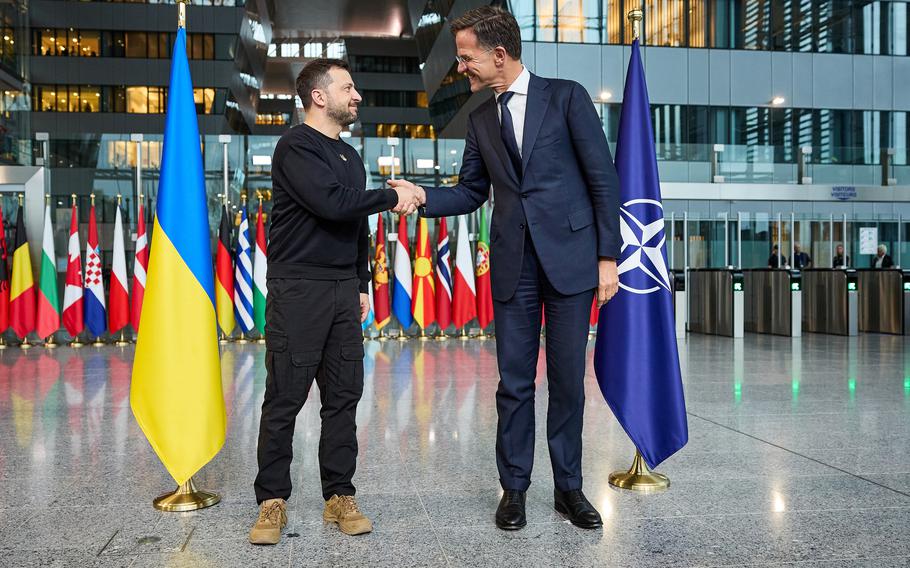
Ukrainian President Volodymyr Zelenskyy shakes hands with NATO Secretary-General Mark Rutte after arriving at the alliance's headquarters for talks, Oct. 17, 2024. (NATO)
Many are wondering what policies President Donald Trump will bring in his second four years in the Oval Office. Members of the Atlantic alliance are questioning what changes NATO will face under current American leadership. Trump’s remarks during his first term encouraged member states to look inward and enhance their security by increasing defense spending. His second term will demand bold actions needed to re-energize NATO and keep the U.S. in the pact. One bold action to make the alliance stronger is to accept new member states that already have experience in fighting Russia.
NATO membership for Ukraine has been floated in many international forums since 2014. A decade earlier, wishing to prove itself as a loyal partner, Ukraine deployed troops to support American operations in Iraq. Now Ukraine holds the front line against Russia’s armed aggression — the very reason for NATO’s existence. While bearing the brunt of the Kremlin’s kinetic and hybrid warfare capabilities, Ukraine continues to expose and exploit the incompetencies and vulnerabilities of Russia’s military.
Ukraine possesses one of Europe’s largest, most capable, dedicated, and innovative armies. For almost three years now, Ukrainian troops have successfully resisted the Russian army, which was once considered one of the strongest in the world. Having Ukraine as a NATO member would enhance European security and help to achieve the goal of increasing self-sufficiency set by Trump during his first term. In fact, Ukraine’s integration would also demonstrate NATO’s commitment to shared values of liberty and the rule of law, further solidifying the bond among alliance members. Fear of Russian reaction is unfounded. If Russian President Vladimir Putin cannot take Ukraine, he certainly can’t defeat NATO, especially when he has already become dependent on North Korean artillery, ammunition and troops.
Another European country that understands facing a larger neighbor’s hostility is Kosovo. From the Yugoslav wars to declaring independence in 2008 and up until today, Kosovo is continuously facing Russian-backed Serbian aggression and disinformation. A NATO-led international peacekeeping force has been present in Kosovo since 1999 and is operating jointly with the military of Kosovo. This makes the Balkan country a training ground for NATO.
Similar to Ukraine, Kosovo has recent experience in countering aggression. In 2023, Serb militants organized a terrorist attack in the city of Banjska, taking the life of a Kosovar police officer. The event once again exemplified the level of threat that Kosovo is under and showed the need for a broader Western integration. In fact, there have been numerous clashes at the border between forces from both sides, initiated by the Serbians, often with the intent of demonstrating strength or testing the limits of how far the West will go to protect Kosovo.
Extensive support from the alliance has been given to the country since 1999. Accepting Kosovo into NATO is a natural step to strengthen NATO peacekeeping presence and counter Russian meddling in the Balkan region. The Kosovo Security Forces have already become a NATO asset. Their expertise was critical during search and rescue operations after the deadly earthquakes in the NATO countries of Turkey and Albania.
In addition to strengthening Western defense, NATO membership of Ukraine and Kosovo will send a clear signal to the international community, showing the unity and resilience of the West. With Putin’s goal to intimidate the West and to shrink the alliance, NATO’s expansion will counter the Kremlin and increase Trans-Atlantic power. For the Trump administration, supporting such expansion presents an opportunity to affirm the U.S. as a global leader, a status that diminished significantly under the previous administration.
NATO is a sum of its members. Support from smaller NATO members such as the Baltic states for Ukraine from the outbreak of the full-scale Russian invasion shows that an alliance works on each country using others’ strength, and that individual member states will provide support if they believe and trust in the cause. Although the U.S. is the backbone of NATO, it should not, as Trump conveys, be expected to shoulder overwhelming responsibility.
As the Russian spring offensive nears, the expectation of trust in NATO is higher than ever. Ukrainian and Kosovar entry into NATO would provide the alliance with a stronger position to deter aggression. As European defense budgets fulfill Trump’s call for increases, militaries and intelligence agencies among member states must be brought closer together. Admission of these two states will discourage the ongoing spread of Russian-generated turmoil into other targeted countries such as Moldova, which Putin expected to conquer immediately after his intended march through Ukraine.
After four years of former President Joe Biden’s indecision, Trump quickly signed numerous executive orders and has declared his determination to take decisive action on Ukraine. Trump has stated he will increase sanctions on Russia if the Kremlin remains uncooperative in peace negotiations. Trump seems determined to leave a lasting legacy through strengthening America’s geopolitical influence. The ties that bind NATO together are dedication to democracy and commitment to collective security. Kosovo and Ukraine are already at the center of NATO’s focus and ground zero of Moscow-generated conflicts. Granting these countries NATO membership would ensure that such conflicts are ultimately contained until becoming non-existent.
Wes Martin, a retired U.S. Army colonel, has served in law enforcement positions around the world and holds a MBA in International Politics and Business. In 2003 and 2004, he worked with all coalition forces (including Ukrainians and Moldovans) while serving as senior antiterrorism officer for Iraq.